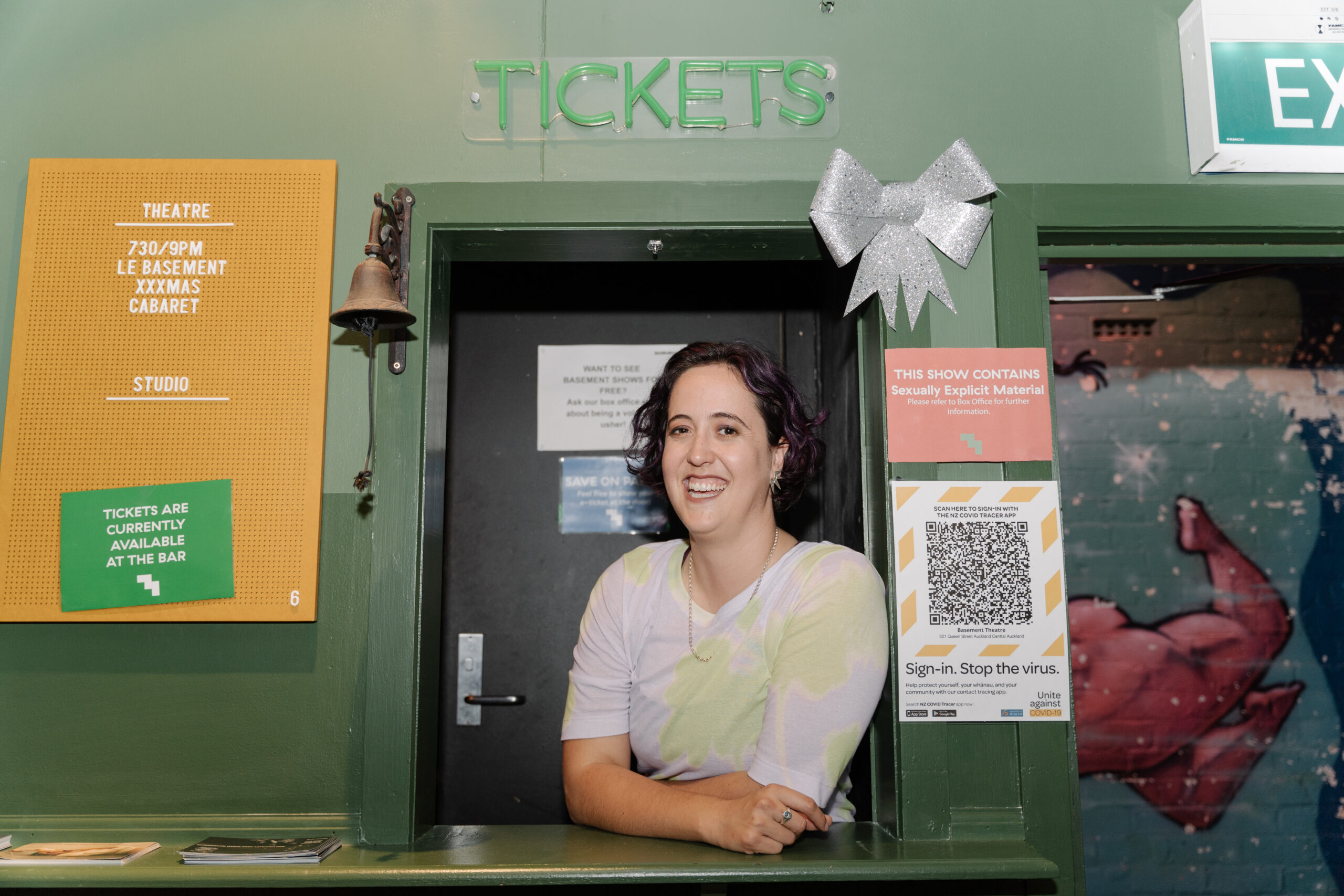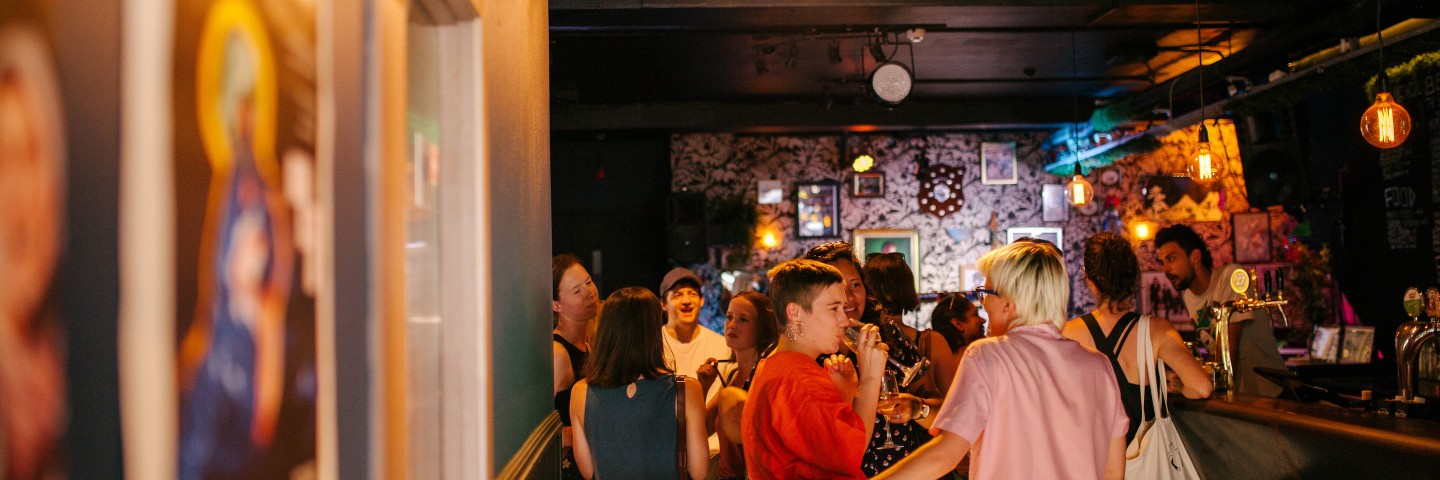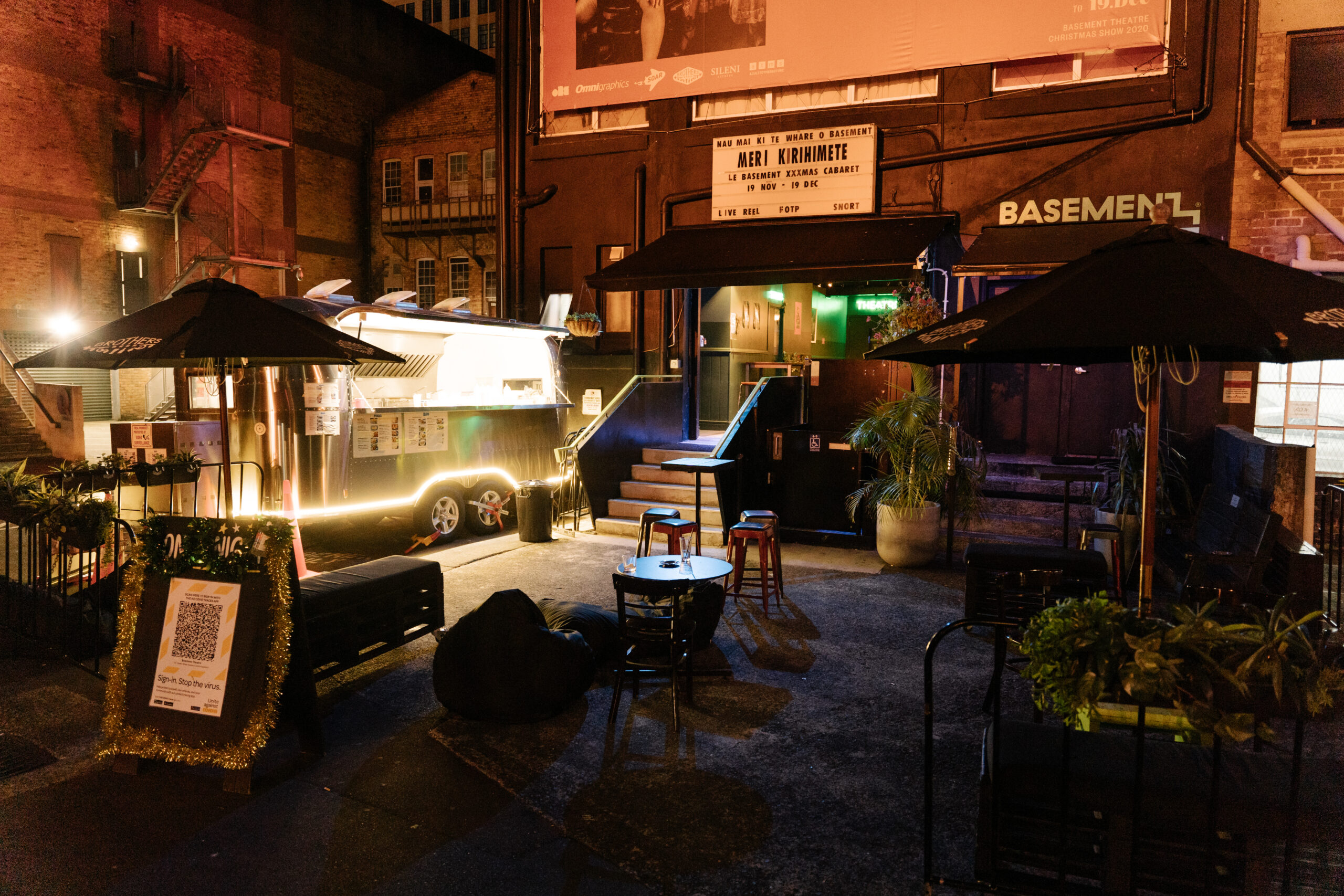Elise Sterback Interview - Te Taumata Toi-a-Iwi
Elise Sterback is leaving The Basement theatre after seven years as its Executive Director. Battling post-Covid instability, she’s led the Auckland institution to a new artist-first strategy, renewed long term funding and game-changing sector vision.

Interview
Seven years is a long time. As well as needing a lie down, what are some of the things that you're most proud of achieving?
Well, I'm most proud of making an organisation that feels like it's here to stay, you know, and when I joined that was very much in a reactive space of just trying to keep the doors open and deal with whatever issue popped up. And it seemed like they were kind of constant – plumbing things in the building or the next funding deadline. And I think I was able to bring a bit more of a longer view into the future and come up with plans and strategies to take things to the next level.
Last year we renewed The Basement’s Creative NZ funding for six years, which is like the longest kind of commitment we've had from a funder. That was massive and it was an increase in funding that has enabled us to do a bit more and have more impact.
The first five years of Basement were really about having an affordable venue for people to use. Now we’re shaping the pathways that allow live performance to happen. It’s how people enter the industry and it's become a space that people relocate to Auckland for, to get their start. I’ve seen people start that journey and then get to a place of real success in their careers.
So you feel like you're leaving the theatre in a positive space?
Absolutely I think there's a really high standard of professionalism in place now, as well as strategic and future thinking and responsiveness to the community. I feel like the space is more accessible and welcoming to wider groups of people now, and not just an industry community, which has been really exciting to see.
It does feel really welcoming. Every time I go there, I don't feel like I'm an outsider.
Oh, that's huge. That's actually really nice to hear at this point. Early on we set the goal of everyone feeling at home at The Basement. We did that because we knew that for some people, it was their home, but we knew that it could feel exclusive. So people saying that they don't feel that it’s like that to me is a massive win. There's always a new group coming in and making it their space and it's not owned by any one group, which was really important to me and to us as a team. I feel super proud of that.
I think the other thing I would say that I'm really proud of is the branding and visual identity. I've always found that when you can get how things look and are presented to the world right, then it kind of lifts everyone's expectations about the value of what you're doing. It elevates things massively. I have so much love for the grungy street art origin roots of The Basement. I think that was an era that must be celebrated, but I'm also glad that we were able to evolve out of it and keep relevant. There's always been this tension and balance of trying to avoid becoming too legit, and keeping our authenticity. But at the same time still believing that we have value and importance, and deserve to be recognised for that.
For so long, artists viewed The Basement as a great place to start, but once they were at a certain level, they felt maybe they’d grown beyond it. But there's something in the brand and atmosphere and intention that we've been able to continue to evolve where we've more recently had artists who are super successful actually turn around and come back and say, no, this is my home. I still want to bring new work here. It's a place for me, a safe place for me to experiment as an established artist. I think that's really important – just as important as being the first step for people.

Over the time you've been there, how do you think the basement’s place in the wider arts ecosystem has changed?
That’s something we talked about heaps when we were writing our 10 year strategy a year or so ago. We really felt like we'd achieved that original vision of being the space for developing emerging artists. We were producing so many shows. I'd say 2018 was peak Basement because we had 80 shows through and 700 artists and it was just so much. It was so full on for our team and we had to pull back. Because it's not all about quantity. And actually the impact that we were having on the sector was there was an over-saturation of people wanting to make art.
Because that was always our core objective. Thinking we've got the space, so we have to make it as accessible as possible, fill it with as many artists, never close our doors for a day. And we really believed that. So more recently we've started to realise that actually it's okay to be a bit more strategic and to think about artists’ sustainability, which is the real challenge. The Basement actually hasn’t made any impact on that, I would say. We've made venue hire cheaper, but we haven't made people's careers more viable. Which is a huge thing for us to take on, but we have taken it on.
So that's a focus for the next five to 10 years?
It is, yes. And it has to be a partnership with a whole lot of players in the sector. It has allowed us to hold back on quantity and say, well, actually it's more important that we support a smaller group of artists to have sustainable careers, than a larger group to have absolute struggle street careers, and make the sector even more competitive. It's scary too, because it's really hard to say to your funders that you’re doing less and you've got to be able to be much more sophisticated in how you articulate your impact because you can't just say, ‘this year we had 10,000 more people through the doors and this many more artists and this any more shows’ on which is just tick, tick, tick for funders. But it’s actually not always what the sector needs, you know?
We also noticed that there was this massive chasm opening up between emerging and established artists. So at the mid-level, it was really hard for people to sustain a practice and they were dropping out. Artists would start out, then after five or so years of just trying to make a career of it would just give up. It's when people hit their thirties. It's like, ‘Oh, I don't have any income and maybe I want to have a nice place to live in and a family. And shit's getting real and my arts practice is not going to sustain basic life plans’. And that's so sad. It’s not okay. And yeah, so that's why we made the decision to pivot very intentionally towards still supporting emerging artists, but not having that be our core purpose. Because no one else is providing that middle stepping stone.
If we're not providing that middle step then we’re also doing a disservice to emerging artists because we're helping them enter, but then there's nothing for them. So there's got to be that next step that people can aspire to. And I'm so glad to say that a big part of that was being successful in Creative NZ’s adaptation fund this year, which is a one year fund that they opened in response to COVID for their existing clients.
What we came up with was an evolution of the risk share/affordable venue model, to a co-production model called Basement Co-Pro. We're hoping to do about 9 to 12 shows each year under this model. The way it works is that we underwrite the production. That's key. I think that needs to be happening for all live performance in New Zealand at the moment, which is a big thing that many in our sector are advocating for.
Is anyone else doing this?
Not that I've heard of, yet. We're going to underwrite up to the equivalent of 45% of ticket sales, which is what tends to be what most people budget their break even on. So it's a guaranteed income that artists are going to get and we also give a cash advance towards production costs, and we are going to do all the marketing for the shows. We will also assign a producer for two months to work on the show because producers are so underrated in our sector. They rarely get paid for their work and they are responsible for bringing all the money. They're the key to the sustainability of each project.
So I think it's a total game changer for the sector. If we can do 10 shows like that a year, there's your incentive. You can still come and do a risky thing and fail and experiment. I still think that’s really important. We don't want to remove failure from the creative process, especially when you're super emerging. You have to prove yourself a little bit. But if you do, if you get over that initial hurdle and you have a go and you sort of refine your practice and your thinking, then there's this opportunity waiting for you.
So this was your idea, your pitch to Creative NZ?
Yes – I was looking through my producer lens, and after 7 years at Basement I knew this is what was needed. We collaborated with BATS Theatre on the idea and they made the same application, and also got funded. It's really nice to have that consistency across venues and just to work collaboratively. There's something about Covid that really enabled the sector to be more open to collaboration too. That’s what the arts sector needs, to have those conversations around strategic alignment. That's how we become a united powerful sector that can self-determine our own needs.
Covid has provided a lot more opportunity to re-think models, and the time and space to pause and reset and start anew – while we were closed during lockdown was actually the busiest time of my life.
So you didn’t get a break, at all?
No, hell no. Well, it's funny. I don't know if people really understand it because they think, oh, well the doors are closed, so what were you guys doing? We were closed for six months, but we had all of our development programs running, we delivered a Matariki residency season in between lockdowns and we just did so much COVID planning.
It was so intense because it felt really urgent and really desperate in a way – how do we navigate this and how do we survive this? But because we were able to puzzle it out and put the plans in place, our team is so confident now, and we know exactly what to do, like this kind of beautiful well-oiled machine. So I don't leave The Basement feeling worried about it. And now that we've got the funding, we can look after artists too. So if their shows get canceled due to Covid, they'll still get the guarantee and they'll be ok. I'm so grateful to get that funding. It just feels like a parting gift that I can offer the organisation, you know? It almost killed me writing that application. And I heard from other organisation leaders for who it was all just too much, it was horrible. There was so much pressure and I can totally understand how some people couldn't see that through. It's too much to think about. It’s heartbreaking.
What are some of the reasons that you think we still don't have a national strategy?
I love that question because that's sort of what I want to provide the answer for through my PhD. Why don’t we have it? Because we don't have the right structure in place to deliver it. I think also it's about the capability inside the ministry. You’d think the Ministry for Culture and Heritage would be the one to develop it, but they haven't had an arts focus for a long time. They've defined culture in quite different ways, where the arts is seen to play a very small part. And Creative New Zealand does some great work, but they're not a policy development organisation.
So we need to give some real policy heft to someone and task them with that job. I do think we have a Prime Minister that really understands arts policy and the art sector. It's just whether she has the capacity to actually share that understanding with the people that she oversees.
I want to see a much stronger sector voice. One thing I've found is that there's very little willingness to fund and resource and provide administrative support and the structures that actually enable the sector to have a platform. So the sector has been left to come up with that itself. And it hasn't because, in my experience, you're just trying to get through the week – keep your organisation alive. You don't even have time to connect with other organisations in your sector. You're trying to deliver to your charitable purpose and that consumes your whole world, and it's so hard to reach beyond that and have impact in a wider sphere. And why should you have to build that platform for yourself? It's such a tall order in a sector that has been, for a decade, criminally underfunded. And so we’re all in this total scarcity mode. It’s a vicious cycle.
You’re going to remain part of the Te Taumata Toi-a-Iwi (Auckland’s arts regional trust) board. Where do you see its role moving into 2021?
Yes. When I joined the board, it was just at the start of re-thinking the strategy. It was really exciting to be with a board that was willing to identify the gaps and needs of the sector and then create a strategy to respond to those and take leadership, which I think was really missing in our sector for a long time. We often walk on eggshells around each other in our sector – we’re so conscious and hyper-sensitive, we’re scared to step on anyone's toes or fail.
It's been really exciting to take these bold steps with Te Tauama Toi-a-Iwi and lead some advocacy conversations for the sector, in what I think has been a really enabling, collaborative way. To help decision-makers who aren't that motivated to engage, to be able to easily engage when they want to. The sector has to present as a united voice, even though we are diverse and we always will be. There has to be some element of unity for us to influence things and ensure politicians take us seriously and listen to what we have to say.

